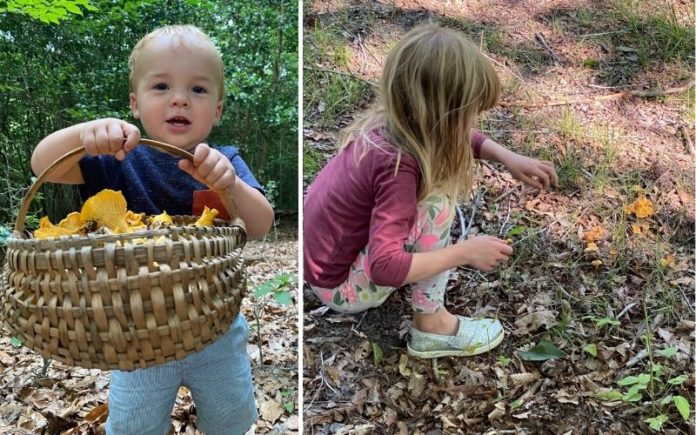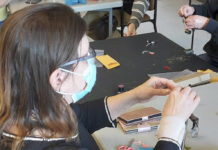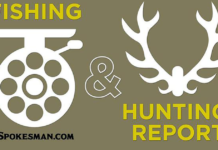This avid outdoorsman is sharing his love of foraging with his children.
The author’s son and daughter out foraging for mushrooms on their property.
By Molly Kirk/DWR
Photos by Courtesy of Rick Blackwell
When Rick Blackwell’s children ask him to take them foraging, he’s more than happy to comply. He ventures into the acres of woods behind their Old Church, Virginia, home with his 5-year-old daughter and 2-year-old son, and they happily search for fungi together. During their time outside, they see deer, turkeys, and all kinds of wildlife. They also frequently bring home baskets brimming with edible mushrooms.
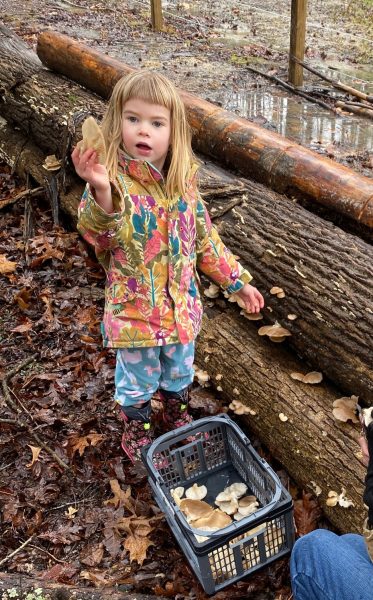
Rick Blackwell has passed on his love of foraging to his daughter.
“It’s a great way to spend time with them. It’s fun to see them excited about finding the right mushroom. And it’s learning about the woods—not just the mushrooms, but everything you find,” said Blackwell. “When they ask me if they can go mushroom hunting, it’s like a license to do something I already wanted to do, and I get to do it with them.”
For Blackwell, foraging is a time to clear his mind and escape a bit. “Our minds are working on stuff all the time. You’re working out a problem in your career or your life, or you’re worried about something, but I’m when I am searching for a black trumpet on the forest floor, I’m pretty much just doing that,” he said. “My mind is still and I’m just enjoying that exercise of looking for mushrooms and picking them. You’re getting fresh air, getting exercise, and it’s a relaxing and disconnecting kind of thing. And if you have your kids with you, it’s even better. But it’s different than watching TV with them. It’s different from driving in the car with them. There’s nobody else around and you’re all focused on the same thing.”
The Gift of Lifelong Pursuits
Blackwell learned foraging while growing up in Maine. A neighbor offered to teach Blackwell and his friends to fly fish. Blackwell’s parents were supportive as he developed his love of the sport, but he needed to raise his own money to buy a fly rod. The neighbor taught him and his friends another skill to raise some funds.
“A way to make money was go pick matsutake mushrooms, and he had a buyer that would buy them from us,” Blackwell said. The neighbor educated them about different mushroom species and what varieties were edible and marketable. Matsutakes grow in the Northeast and Pacific Northwest. “We were able to save enough to buy a fly rod [with the earnings]. I look at it as a gift. It gave me a lifelong gift of learning how to fly fish, and then I’m still doing foraging with my kids 30-something years later.”
Fly fishing and foraging got put on the back burner while Blackwell attended college and then served in the military, but once he settled into a career in finance and purchased a large piece of property in Hanover County, he got back into the woods and on the water, as well as turkey hunting. “Eventually you reach a point where you get back to some other things that just make you happy. And I realize I just love foraging,” he said.
He was thrilled when both his children expressed an interest in learning in the woods and hopes it helps spark their interest in other hobbies in the outdoors. “But even if they don’t develop other outdoor hobbies, the time I’m spending with them doing it now is worth it. I don’t care if they have no interest in it when they’re older. I love doing it with them right now. It’s a very valuable time to connect with them.”
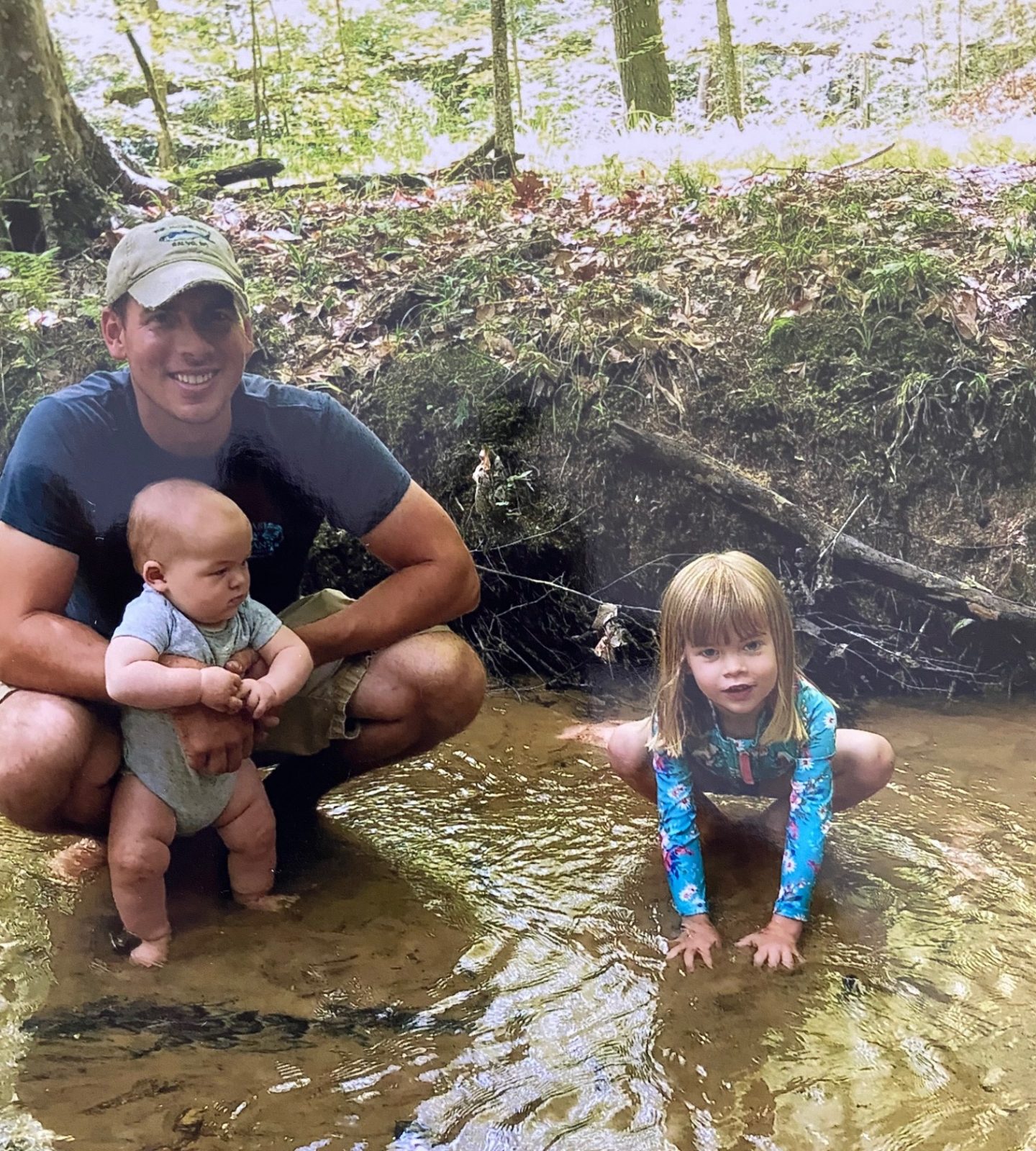
Rick Blackwell loves spending time in the outdoors with his children, no matter the activity.
Forage Safely
Of course, foraging for edible mushrooms safely is a necessity. Blackwell has taught his children to identify edible varieties and he always supervises them. He’s also set some hard and firm rules: “Number one, you never eat a mushroom in the woods,” he said. “Mushrooms get eaten in the kitchen and the dining room in the house. Number two, we don’t collect mushrooms that we don’t know. You don’t want to mix an unknown with what you’re eating. Because even just making contact in a basket, you could potentially have like spores that contaminate the edible mushrooms. So we only collect the ones that we are very confident in what they are. And then the third rule is, before we prepare a mushroom, we get the book out and we identify it. I’ve done this thousands of times, but with the kids, I make sure to take that step of going back to the house and identifying the mushrooms so that they get that training.”
Blackwell and his family enjoy cooking and eating the mushroom varieties they gather, including chanterelles, morels, black trumpets (Blackwell’s favorite “they’re plentiful and absolutely delicious”), oyster mushrooms, chicken of the woods, and lion’s mane.
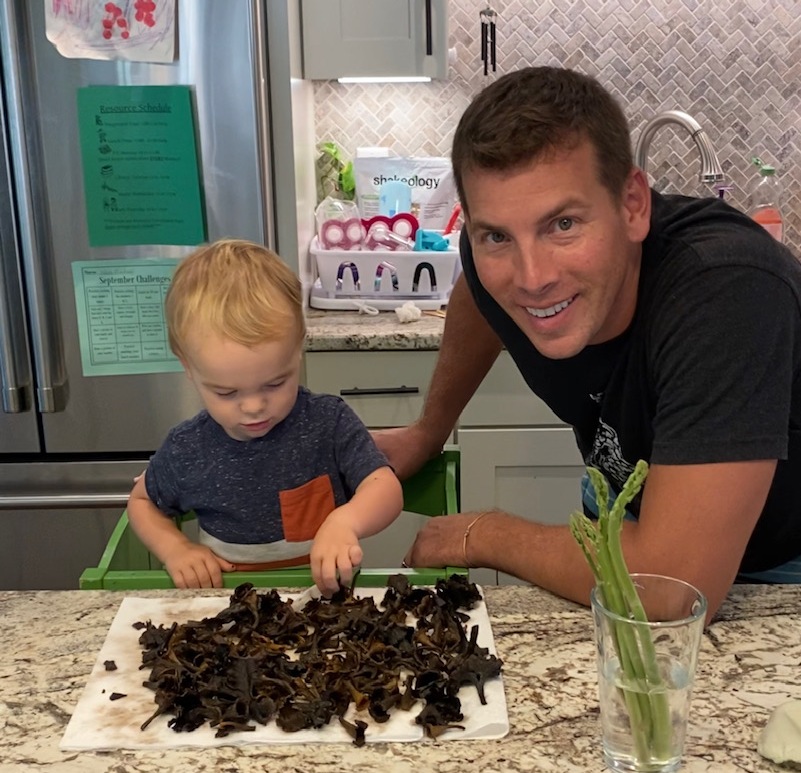
Rick Blackwell and his son look over their haul of black trumpets, or black chanterelles.
And he notes that mushroom foraging is a year-round activity. “The trumpets and the chanterelles run through the summer,” Blackwell said. “When they stop is kind of when the oysters start, and when the oysters are all gone, it’s time to start thinking about the morels. It’s a hobby unlike hunting turkeys where you have a specific season and then you put all your stuff away and you wait for next year. This is something you can do all the time if you have the time and space.”
Make a Plan
Blackwell has the luxury of many acres of his own property to forage upon, but public lands such as National Forests and DWR Wildlife Management Areas (WMAs) are open for foraging. (Be aware of hunting seasons while foraging on public land.) To forage on a WMA, you need an access permit, valid Virginia hunting, fishing, or trapping license or boat registration, or a Restore the Wild membership. On WMAs, berry picking and gathering of mushrooms and other fruits is allowed for personal use only. Gathering for commercial purposes is prohibited.
If you’re new to foraging, it’s advised to seek out an experienced mushroom gatherer to help guide and educate you. You should also carry a guide to mushroom species to help identify edible mushrooms and poisonous or hallucinogenic lookalikes. In addition, always cook wild mushrooms before eating.
Credit: Source link

















